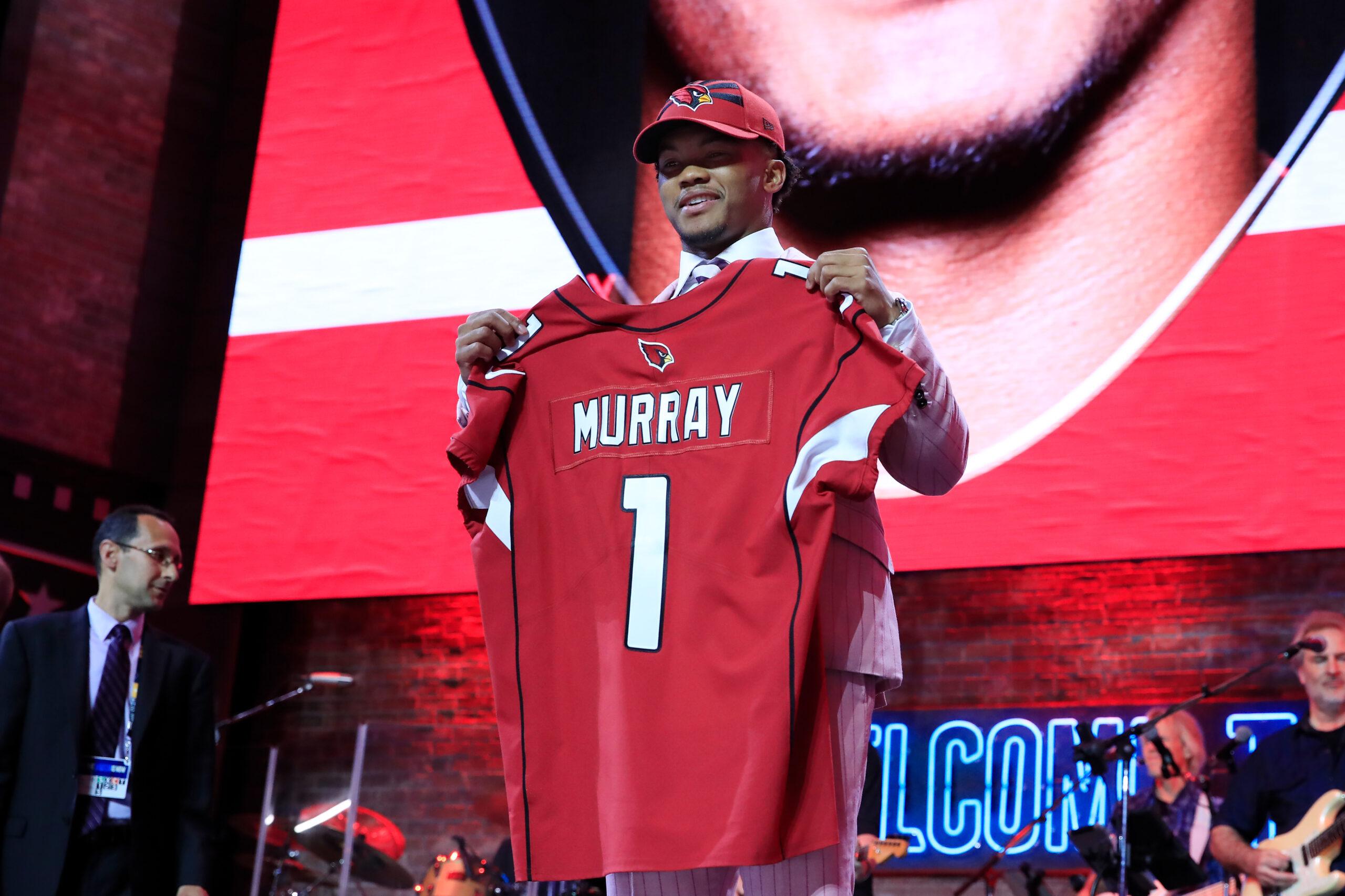
The three most exciting and grueling days of the NFL offseason calendar have come and gone: 254 picks have been made, a throng of trades have been completed, and the 2019 draft is in the books. That means it’s time to take stock of all that went down—the good, bad, and everything in between. To make sense of the weekend that was, I’ve come up with a few awards to highlight the biggest developments of this draft.
The Value Is Just a Social Construct Award: New York Giants
Giants general manager Dave Gettleman may have come away from Thursday night’s first round thinking that he found a future franchise quarterback in Duke’s Daniel Jones and two first-year starters in Clemson defensive tackle Dexter Lawrence and Georgia cornerback Deandre Baker. I, however, came away thinking New York failed miserably in maximizing its treasure trove of draft capital. Big Blue reached for a quarterback I view as a flawed, developmental passer with the no. 6 overall selection, used the no. 17 pick it got as part of its March trade of Odell Beckham Jr. on a nose tackle, and then dealt back up into the first round—sending the Seahawks second-, fourth-, and fifth-round picks (nos. 37, 132, 142)—to take the first cornerback off the board in a notably deep class at that position.
Paired with the decision to take a running back with the second overall pick last spring, it’s become clear that Gettleman—and perhaps the franchise at large—has absolutely zero understanding of concepts like positional value and opportunity cost. Running back and nose tackle are among the most fungible positions in the modern game, and while Jones may develop into a starter at some point, Gettleman told reporters that he could sit a year … or two … or three behind Eli Manning, leaving the Giants looking for help at other key positions while squandering several seasons of Saquon Barkley’s prime. At the very least, New York indisputably has cornered the market on Senior Bowl MVPs: The franchise has drafted the last three of them (Jones, Kyle Lauletta, and Davis Webb).
Instead of grabbing Jones, the Giants could have taken an impact starter at a premium position like edge rusher or offensive tackle. Instead of picking Lawrence, they could’ve landed a pass-catcher like Marquise Brown, who went to the Ravens at no. 25. Even giving up three picks to move back up into the first round and grab Baker, a player I like a lot, felt like an overpay and misuse of precious draft capital, especially for a team that is not one cornerback away from fielding a contender.
Over the past two years, Gettleman has dismantled the Giants’ roster while building up a stockpile of draft assets. What he’s done with those assets is not sitting well among the team’s fan base.
The Gruden (Tape) Grinder Award: Oakland Raiders
The Raiders didn’t seem overly concerned about value with their trio of first-round picks either, selecting Clemson defensive end Clelin Ferrell at no. 4, Alabama running back Josh Jacobs at no. 24, and Mississippi State safety Johnathan Abram at no. 27. (The Ferrell pick was widely panned as a reach, while running back and strong safety are often viewed as two of the lowest-value positions in the sport.) But forget value when trying to assess these picks; head coach Jon Gruden and GM Mike Mayock clearly had a type: physical players known for their toughness. In other words, the exact kind of guy Gruden used to celebrate weekly on Monday Night Football.
This was a Gruden Grinder draft class for the ages: Ferrell is a high-floor, high-character prospect who should bring leadership to Oakland’s new-look defensive front. Jacobs is a fearless, bruising runner who will bring a Marshawn Lynch–esque vibe to the offense. Abram is a mini Kam Chancellor, delving out hits and playing with his intensity turned up to 11. Then there’s fourth-round defensive end “Mad” Maxx Crosby, who plays like a berserker and forced eight (eight!) fumbles over the past two seasons. He’s going to help Gruden get after it, man.
Oh, and Oakland used a fifth-round pick on Clemson receiver Hunter Renfrow, who was all but created in a lab to embody grit. Taken altogether, it’s easy to see what this Raiders’ regime is trying to build.
The Best Fantasy Football Draft Award: Arizona Cardinals
The Cardinals had the flashiest draft of any team in the NFL. After taking Oklahoma quarterback Kyler Murray―a dual-threat prospect unlike any other and the most exciting player in this class―with the no. 1 overall pick, GM Steve Keim and new head coach Kliff Kingsbury went out and built a proper fantasy football roster. Arizona used the no. 62 pick on UMass receiver Andy Isabella, an ultra-fast, quick-cutting pass catcher; the no. 103 pick on Iowa State receiver Hakeem Butler, a 6-foot-5, 227-pound vertical threat with turbo boosters strapped to his feet; and the no. 174 pick on Fresno State receiver KeeSean Johnson, a productive possession receiver with good hands and athleticism. Drop them into an offense that already has Larry Fitzgerald, Christian Kirk, David Johnson, Charles Clay, and Ricky Seals-Jones, and Kingsbury can ignite this passing game.
The Cardinals also dealt quarterback Josh Rosen, a 2018 first-round draft pick, to the Dolphins, recouping value for a player who was no longer part of the franchise’s future. The 2018 Cardinals ranked dead last in Football Outsiders’ offensive DVOA; the 2019 draft should ensure that this season’s group finishes significantly higher than that.
The What Is Dead May Never Die Award: New England Patriots
Football fans should have long ago accepted that the Patriots will win double-digit games and the AFC East every year until the sun burns out. The 2019 draft only further supports that. The reigning Super Bowl champs came into the weekend with a plethora of early- and mid-round picks and used them to acquire impact contributors at several positions where they previously lacked depth. New England started off by taking Arizona State’s N’Keal Harry with the final pick of the first round. Harry is a physical, box-out receiver with strong hands and a massive frame, and he should provide Tom Brady with a reliable presence both on the outside and in the slot.
The Pats then traded up in the second round to grab Vanderbilt cornerback and press-coverage specialist Joejuan Williams and added Michigan edge rusher Chase Winovich, Alabama running back Damien Harris, and West Virginia tackle Yodny Cajuste in the third. All five players have a chance to play important roles in 2019, either as starters or rotational contributors. Bill Belichick’s crew got a whole lot deeper before embarking on another quest to defend its crown.
The Patience Is a Virtue Award: Washington Redskins
In most drafts, there are two ways for a team to land one of the top-ranked quarterbacks in a class: It either has to own one of the top picks in the first round or make a massive move up the board to acquire one. Both methods were on full display last year, when the Browns took Baker Mayfield at no. 1 and the Jets, Bills, and Cardinals all traded up within the top 10 to select a passer. This year, however, the Redskins were rewarded for staying put. Instead of mortgaging the future to move up and nab Dwayne Haskins, Washington waited at no. 15 for the Ohio State star to fall into its lap.
Of course, Gettleman and the Giants may have saved the Redskins from themselves; reports came out Thursday that some in the Washington organization would’ve preferred Daniel Jones to Haskins. Regardless of how it unfolded, though, the Redskins got my second-ranked signal-caller in this draft while preserving their draft capital in 2020 and 2021.
The Broncos get an honorable mention in this section, too: Instead of panicking and reaching for Missouri quarterback Drew Lock with the no. 10 overall pick, Denver traded back, took tight end Noah Fant at no. 20, and then made a short move back up the board during the second round to land its man. Lock will have to iron out some mechanical issues in the NFL but has the potential to develop into a dynamic starter. Joe Flacco might just have to look over his shoulder again this fall.
The Eliminating Your Weaknesses Overnight Award: Baltimore Ravens
The Ravens came into this draft with glaring needs at receiver and pass rusher. By the time Friday night was finished, they had added promising players at both spots. Baltimore’s pass-catching arsenal added Marquise Brown and Miles Boykin. Beyond invigorating the depth chart, they should give this offense two completely different kinds of playmakers.
Brown, who was taken in the first round, should line up as the Z receiver or in the slot. The Oklahoma product boasts take-the-top-off-a-defense speed, giving him the ability to bring any catch to the house. Boykin, a third-round pick, projects as a prototypical X receiver on the outside. His athletic profile isn’t altogether different from that of a guy named Calvin Johnson: Boykin has the size and speed to dominate along the sideline and the catch radius to emerge as a force in the red zone.
On the defensive side, the Ravens grabbed Louisiana Tech pass rusher Jaylon Ferguson at no. 85. Ferguson reminds me in some ways of former Baltimore great Terrell Suggs: His athletic profile doesn’t scream “elite edge rusher,” but he plays with extraordinary power and heavy hands, wearing down opposing tackles while relentlessly collapsing the pocket. Ferguson even broke Suggs’s Division I career sacks record. He gives the Ravens a high-floor edge presence and fits the rough-and-tumble AFC North franchise’s identity like a glove.
The I Can’t Believe I Love Their Draft Award: New York Jets
Given the Jets’ questionable moves over the past few years, I entered the 2019 draft skeptical of franchise GM Mike Maccagnan. Yet after watching each round unfold this weekend, the embattled Jets executive slowly started to change my mind. Gang Green hit a home run this year, particularly considering that it lacked a second-round pick.
The Jets opened by grabbing slippery Alabama defensive tackle Quinnen Williams at no. 3 overall, adding a potential Pro Bowler to their defensive line. They then bolstered that group by taking Florida edge rusher Jachai Polite at no. 68; Polite is no sure thing—he bombed during combine testing drills and in interviews before struggling at his pro day—but his tape shows a player with an explosive first step and a repertoire of effective pass-rush moves. New York later grabbed USC tackle Chuma Edoga (no. 92) and Minnesota linebacker Blake Cashman (no. 157), both ranked in the top 100 on my big board.
The We’re Going to Build a Viable Secondary If It Kills Us Award: Tampa Bay Buccaneers
I have a bizarre respect for the Buccaneers’ draft strategy over the past two years. If nothing else, this team is acutely aware that it plays in a division that also features Drew Brees, Matt Ryan, and Cam Newton. After spending mid-round picks on defensive backs M.J. Stewart, Carlton Davis, and Jordan Whitehead in 2018, Tampa Bay went back to the well this April, grabbing Central Michigan cornerback Sean Bunting at no. 39, Auburn cornerback Jamel Dean at no. 94, and Kentucky safety Mike Edwards at no. 99.
Along with safety Justin Evans (a 2017 second-rounder) and corner Vernon Hargreaves III (a 2016 first-rounder), the Bucs should now have a nucleus of defensive backs with whom to work. For a unit that allowed 34 passing touchdowns last fall, 30th in the league, that’s a step in the right direction.
The Trade Like You’re Playing Madden Dynasty Mode Award: Seattle Seahawks
Prior to trading defensive end Frank Clark to the Chiefs on Tuesday, the Seahawks were heading into the draft with a league-low four picks. That must have been a foreign feeling for head coach Pete Carroll and GM John Schneider, who had averaged 9.5 picks per draft in their first nine years together in Seattle. So in classic Seahawks fashion, the team wheeled and dealed and turned those four picks into 11 over the last three days.
After adding a first-round pick via the Clark trade, Seattle set about trading back at every turn. That started when they moved from no. 21 to no. 30 in a deal with the Packers, getting picks nos. 30, 114, and 118 back in return. The Seahawks then traded out of the no. 30 spot, getting picks nos. 37, 132, and 142 back from the Giants. Both deals were huge positives for the franchise according to Chase Stuart’s draft value chart. The Seahawks did make a few picks here and there (and also traded up twice), selecting TCU edge rusher L.J. Collier at no. 29, Utah safety Marquise Blair at no. 47, Ole Miss receiver D.K. Metcalf at no. 64, and Utah linebacker Cody Barton at no. 88. By the time Friday night was over, Seattle’s moves had produced the equivalent of an extra early first-round pick.
Including the Clark deal, the Seahawks made eight trades this week and picked 11 times, tied for second most among all teams. There’s risk involved with trading back from premium slots, particularly in the first round. But Seattle has long believed that the more darts you throw at the draft board, the more targets you’ll hit.
Not bad.

